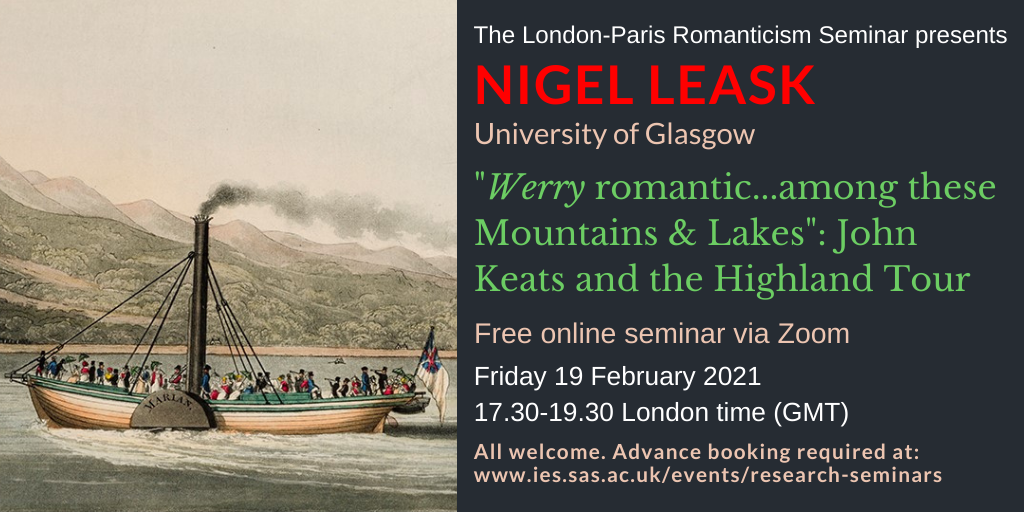
The next meeting of the London-Paris Romanticism Seminar will take place via Zoom on Friday 19 February 2021 at 17.30-19.30 London time (GMT). As our guest speaker, we are delighted to welcome Professor Nigel Leask of the University of Glasgow, who will deliver a paper entitled “Werry romantic…among these Mountains & Lakes”: John Keats and the Highland Tour. His illustrated talk will be followed by a discussion in which questions from the audience are invited. The seminar will be chaired by Gregory Dart (University College London).
The seminar is free and open to everyone. Prior registration is necessary. To book a place via the Institute of English Studies website, click here and scroll down to the relevant seminar. When you register, you will be provided with a Zoom link and details of how to join the online forum. Whether you wish to contribute or simply to listen in, we invite you to join us.
Nigel Leask is Regius Chair in English Language and Literature at the University of Glasgow. He has published widely on British, Irish and Scottish romanticism, with a special emphasis on orientalism, popular culture, travel writing and ‘improvement’. His books include British Romantic Writers and the East: Anxieties of Empire (1992); Curiosity and the Aesthetics of Travel Writing, 1770–1840: ‘From an Antique Land’ (2002); Robert Burns and Pastoral: Poetry and Improvement in Late Eighteenth-century Scotland (2010); and an edition of Robert Burns’ Commonplace Books, Tour Journals and Miscellaneous Prose, the first volume of the Oxford Edition of Robert Burns’ Writings (2014). In 2014-18 he co-directed the AHRC-funded project ‘Curious Travellers: Thomas Pennant and the Welsh and Scottish Tour, 1750-1820’. His latest monograph Stepping Westward: Writing the Highland Tour 1720-1830 was published in 2020. He is also co-editor of Old Ways and New Roads: Travels in Scotland 1720-1832 (2021), published to accompany a Hunterian Art Gallery exhibition that has been transferred online due to Covid. He is a Fellow of the British Academy and of the Royal Society of Edinburgh, and a Vice-President of the Association for Scottish Literary Studies.
Regarding the subject of his talk, Nigel writes:
‘Keats’s facetious account of his 1818 six-week northern tour with his friend Charles Armitage Brown, particularly the soft “v” in “werry”, suggests a touch of “Cockney carnivalesque”. My talk explores this spirit both in Keats’s tour itself, and in the episodic account of it which he furnished in letters to his brother Tom, to George and Georgiana Keats, and friends like Reynolds and Bailey. I’ll consider his tour writing in relation to other romantic period travel accounts about Scotland, considering the literary influence of Wordsworth, Burns, and Scott, the latter a significant absence from Keats’s tour, in contrast to the narratives of other contemporary tourists. Keats’s version of romantic pedestrianism is an exercise in masculine self-fashioning and social mobility, which I read as a cultural performance in its own right, albeit one that proved fatal to his health. Attention is paid to costume and “knick-knacks”, to his itinerary, and the guidebooks employed by the tourists, as well as their relations with local people, especially in the Gaelic-speaking Highlands. Keats’s accounts of key sites, like Loch Lomond, Inveraray, Mull, Iona, Staffa, and Ben Nevis are analysed in relation to the often light-hearted tour poetry they inspired. Contemporaries criticized the Highland tour in the post-Waterloo period as a commodified and cockneyfied cliche, especially in the wake of the craze for Scott’s Highland romances. This is reflected in Keats’s ironical negotiation of the Scottish “beaten track”, which anticipates the poetic spirit of his last years.’